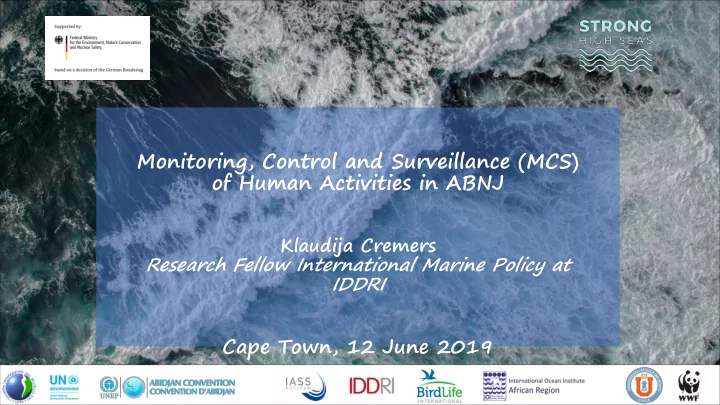

Monitoring, Control and Surveillance (MCS) of Human Activities in ABNJ Klaudija Cremers Research Fellow International Marine Policy at IDDRI Cape Town, 12 June 2019
• MCS expert workshop I (technological tools) – Paris, July 2018 • MCS expert workshop II (policy options) – Paris, April 2019 • Regional MCS workshop CPPS – November 2019 • Regional MCS workshop Abidjan – 2020
Contents 1. What is MCS and why is it important? 2. An overview of MCS tools 3. Best MCS practices 4. MCS challenges 5. How to strengthen MCS? 6. Conclusion 7. Questions
1. What is MCS and why is it important? a) Monitoring - the continuous requirement for the measurement of fishing effort characteristics and resource yields; b) Control - the regulatory conditions under which the exploitation of the resource may be conducted; c) Surveillance - the degree and types of observations required to maintain compliance with the regulatory controls imposed on fishing activities. Source: FAO, 1981
1. What is MCS and why is it important?
1. What is MCS and why is it important? West Africa (Belhabib et al, 2019; Doumboya et al, 2017) Ø Governance issues and high monitoring costs Ø Illegal fishing is responsible for a loss of US$2.3 billion a year, of which only US$13.8 million a year is recovered through MCS Ø Strengthening of the legal system higher fines + increased resources for MCS reducing incentives for IUU fishing + higher chance to catch offenders
1. What is MCS and why is it important? West Africa (Okafor-Yarwood, 2019)
2. An overview of MCS tools What factors need to be taken into account when choosing MCS tools? ● Purpose ● Cross-checking data ● Costs ● Ease of manipulation ● Access ● Privacy considerations ● Reliability ● Capacity to analyse data ● Coverage ● Different actors/stakeholders
Traditional MCS tools: • Inspectors at sea • Logbooks • Naval and aerial surveillance at sea
Automatic Identification Systems (AIS) Vessel Monitoring System (VMS) Source: Pew Charitable Trusts, 2016
Synthetic Aperture Radar (SAR) Source: Schwegmann et al, 2016
Visible Infrared Imaging Radiometer Suite (VIIRS) Source: National Snow & Ice Data Center
E-monitoring Source: WWF, 2018
E-reporting
Drones
3. Best MCS practices 1) RFMOs 2) International MCS platforms and networks (e.g. IMCS network, Southern African Development Community MCS Center) 3) Transnational partnerships (e.g. Global Fishing Watch, FISH-I Africa Task Force)
RFMOs Source: Hutniczak, B., C. Delpeuch and A. Leroy (2019-02-14), “Intensifying the Fight Against IUU Fishing at the Regional Level”, OECD Food, Agriculture and Fisheries Papers, No. 121, OECD Publishing, Paris. http://dx.doi.org/10.1787/b7b9f17d-en
International MCS platforms and networks
Transnational partnerships
4. MCS Challenges 1) A patchwork of MCS rules 2) Lack of capacity 3) Governance gaps
5. How to strengthen MCS? 1) Technological tools 2) Policy options 3) Market measures
5. How to strengthen MCS? Treaty on ABNJ • No global MCS system, but MCS as cross-cutting issue in negotiations • Two-way relationship between MCS and the agreement • Package deal components • Incorporate guiding principles o Cooperation and coordination o Transparency o Reporting
6. Conclusion Ø Many MCS tools available, but problem of implementation gaps and lack of capacity Ø No one-size-fits-all approach to MCS Ø Cooperation and coordination is key: Ø Chair of the FISH-i Africa Task Force: “the cheapest tool in fighting IUU fishing is the sharing of information and intelligence through cooperation among all MCS practitioners” Ø Future high seas treaty: global vs regional MCS standards
7. Questions • What are your experiences with MCS in your country/region? • Could you share some examples of MCS challenges or best practices in your country/region? • How do you think MCS could be strengthened in your country/region? • Are you or someone in your area working on something related to MCS?
Thank you! klaudija.cremers@iddri.org @CremersK IKI STRONG High Seas project @PROG_ocean prog-ocean.org/our-work/strong-high-seas
Recommend
More recommend